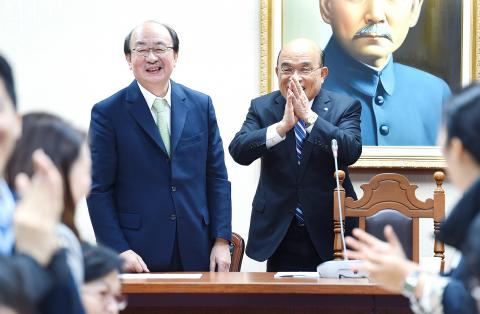The Executive Yuan yesterday unveiled a special bill for COVID-19 prevention, relief and recovery that includes a proposed maximum fine of NT$1 million (US$33,053) for people who break their quarantine.
People who break a home quarantine would face a fine of NT$100,000 to NT$1 million, while those who break a quarantine at a government-designated quarantine center would face a fine of NT$200,000 to NT$1 million, the bill states.
Firms that voluntarily pay quarantined employees, or employees who take leave to care for children under quarantine, would benefit from a break in “profit-seeking enterprise income tax” of up to twice the salary payout, it states.

Photo: Liao Chen-huei, Taipei Times
People who are furloughed after being placed under government-designated quarantine or home quarantine may request compensation from health authorities within two years, it states.
Government agencies, schools and companies may not rule that an employee under quarantine, or taking care of family members under quarantine, is absent without leave, force them to file for leave, or cancel their attendance bonus or deduct days off that they have earned, it states.
Employers who break this rule would be fined between NT$50,000 and NT$1 million, it states.

Photo: Wang Shan-yan, Taipei Times
Individuals or entities who defy an order of the Central Epidemic Command Center, or contingency measures that the center implements, including those who refuse to comply with the government’s setting aside of goods for disease prevention, would also be subject to a fine of between NT$50,000 and NT$1 million, it states.
People who hoard or attempt to hoard equipment or medicines deemed necessary for disease prevention, as published by the Ministry of Health and Welfare, would face a prison term of up to five years and a possible fine of up to NT$5 million, it states.
Those who spread disinformation or rumors about an epidemic to the extent that it hurts the public interest would face a prison term of up to three years or a fine of up to NT$3 million, it states.
The bill stipulates that the health ministry should issue subsidies to healthcare personnel responsible for disease prevention, treatment or care during the COVID-19 outbreak, while employees who prevent COVID-19 with excellence at government agencies, schools, companies or organizations should be rewarded by their employer.
If a person in charge of disease prevention dies from COVID-19, the ministry should subsidize the educational costs of their children, it states.
The bill stipulates that it be funded by NT$60 billion of surplus revenue from prior fiscal years or loans.
Before the special budget is approved by the Legislative Yuan, funding related to company bailouts or the offsetting of economic losses in certain sectors may be appropriated from existing budget, it states.
If passed, the bill would be retroactively applied to Jan. 15 — the day that the disease was declared a class-5 epidemic — and would remain in effect until June 30 next year, except for Articles 12 to 16, which deal with penalties, which would take effect once ratified.
Premier Su Tseng-chang (蘇貞昌) said he approved the bill and has asked government agencies to communicate extensively with the four legislative caucuses so that it can pass quickly.
The Executive Yuan is to finish planning the special budget and unveil it within a week, Su said, adding that the bill would hopefully pass in time to tide over sectors affected by the outbreak.
Yesterday, the Ministry of Economic Affairs unveiled a plan to provide NT$3.47 billion in relief funds to manufacturers.
Deputy Minister of Economic Affairs Wang Mei-hua (王美花) said that the fund would cover local companies planning to move their operations back home amid the COVID-19 outbreak, but the Ministry of Economic Affairs is still assessing whether to subsidize “rootless” firms that do not have facilities in the nation.

EUROPEAN TARGETS: The planned Munich center would support TSMC’s European customers to design high-performance, energy-efficient chips, an executive said Taiwan Semiconductor Manufacturing Co (TSMC, 台積電), the world’s largest contract chipmaker, yesterday said that it plans to launch a new research-and-development (R&D) center in Munich, Germany, next quarter to assist customers with chip design. TSMC Europe president Paul de Bot made the announcement during a technology symposium in Amsterdam on Tuesday, the chipmaker said. The new Munich center would be the firm’s first chip designing center in Europe, it said. The chipmaker has set up a major R&D center at its base of operations in Hsinchu and plans to create a new one in the US to provide services for major US customers,

The Ministry of Transportation and Communications yesterday said that it would redesign the written portion of the driver’s license exam to make it more rigorous. “We hope that the exam can assess drivers’ understanding of traffic rules, particularly those who take the driver’s license test for the first time. In the past, drivers only needed to cram a book of test questions to pass the written exam,” Minister of Transportation and Communications Chen Shih-kai (陳世凱) told a news conference at the Taoyuan Motor Vehicle Office. “In the future, they would not be able to pass the test unless they study traffic regulations

GAINING STEAM: The scheme initially failed to gather much attention, with only 188 cards issued in its first year, but gained popularity amid the COVID-19 pandemic Applications for the Employment Gold Card have increased in the past few years, with the card having been issued to a total of 13,191 people from 101 countries since its introduction in 2018, the National Development Council (NDC) said yesterday. Those who have received the card have included celebrities, such as former NBA star Dwight Howard and Australian-South Korean cheerleader Dahye Lee, the NDC said. The four-in-one Employment Gold Card combines a work permit, resident visa, Alien Resident Certificate (ARC) and re-entry permit. It was first introduced in February 2018 through the Act Governing Recruitment and Employment of Foreign Professionals (外國專業人才延攬及雇用法),

‘A SURVIVAL QUESTION’: US officials have been urging the opposition KMT and TPP not to block defense spending, especially the special defense budget, an official said The US plans to ramp up weapons sales to Taiwan to a level exceeding US President Donald Trump’s first term as part of an effort to deter China as it intensifies military pressure on the nation, two US officials said on condition of anonymity. If US arms sales do accelerate, it could ease worries about the extent of Trump’s commitment to Taiwan. It would also add new friction to the tense US-China relationship. The officials said they expect US approvals for weapons sales to Taiwan over the next four years to surpass those in Trump’s first term, with one of them saying